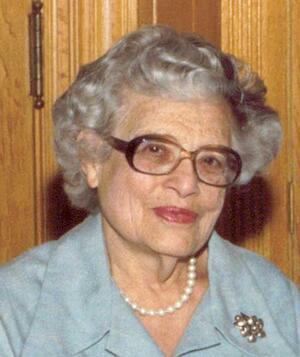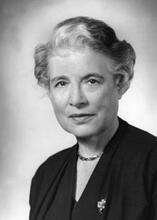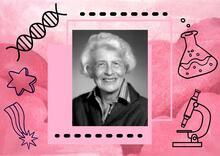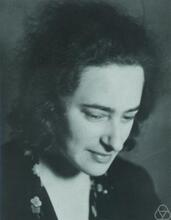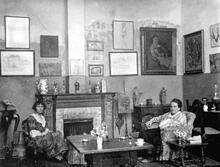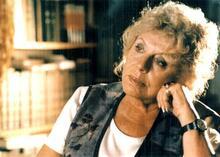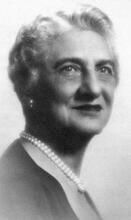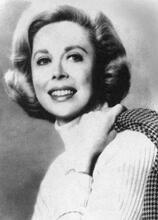Mattie Rotenberg
For Mattie Rotenberg, the first woman and the first Jew to be granted a doctorate in physics at the University of Toronto, family relationships always took precedence over career. She founded Toronto’s first Jewish day school to educate her five children and later embarked upon a second career as a journalist.
Courtesy of Mattie Rotenberg
Born to poor immigrant parents, Mattie Rotenberg was the first woman and the first Jew to be granted a doctorate in physics at the University of Toronto. She grew up in Toronto’s small Jewish community, where she met her husband and later went on to found the city’s first Jewish day school. While raising a family of five children, Rotenberg decided to embark on a second career as a journalist, focusing on women’s and Jewish issues. Despite her successful careers in physics and radio broadcasting, Rotenberg’s family relationships always took precedence over her work.
Early Life and Physics Career
Journalist, educator, homemaker, and community stalwart with a Ph.D. in physics, Mattie (née Levi) Rotenberg was born in Toronto to parents who had immigrated as teenagers when Jewish Toronto was a village with a population of barely 2000. Her father, Paul Levi (1871–1942), came from Mogilev in Russia and her mother, Minnie Fleishman (1872–1933), from what is now Latvia. Her brother was Rabbi S. Gershon Levi (1908–1990). Unlike most Toronto Jews, who were (and are) of Polish origin, the Levis were Litvaks (Lithuanian).
Rotenberg earned her B.A. in mathematics and physics at the University of Toronto in 1921, and in 1926 she became the first woman and the first Jew to be granted a doctorate in physics at that institution. Her dissertation, “On the Characteristic X-Rays from Light Elements,” had already been published in 1924 in the Transactions of the Royal Society of Canada. From 1941 to 1968, she worked as a demonstrator in the university physics laboratory. In those years senior appointments at Toronto in any field were very rarely given to women and almost never to Jews.
Family and Community Involvement
Meyer Rotenberg (1894–1958), a lawyer and businessman whom Mattie married in 1924, had come to Toronto as a boy from Ivansk (Iwaniska) in Russian Poland. The town was the birthplace of many future Jewish Torontonians, thanks to Meyer’s father, who acted as a travel and informal immigration agent for Jews. The newly married couple decided upon a lifestyle that was to be different from that of other first- and second-generation Canadian Jews. In an era when “No Jews allowed!” signs were common on Toronto lawns, they “invented for their family” of five children—Aubey (1925–2013), Hart (b. 1926), Lailla (Rapoport, b. 1928), David (1930–2022), and Daniel (1934–2000)—“a unique culture of [Jewishly] observant Anglo-Saxon aristocracy illuminated by reason and bolstered by education,” as her granddaughter, writer Nessa Rapoport (b. 1953), has put it. To ensure that her children would receive a holistic education well-grounded in both Jewish and secular studies, Mattie founded the Hillcrest Progressive School in 1929, Toronto’s first Jewish day school. She served as its director and in other capacities until 1944, when the youngest of her children left the school. Today, the school still exists, but only as a pre-school and no longer exclusively Jewish, although its curriculum retains an “emphasis on Jewish tradition.”
Journalism
In 1930, Rotenberg embarked upon a second career as a journalist. She joined the staff of The Jewish Standard under editor Meyer Weisgal and for two years edited the women’s section and wrote a weekly column, “As the Woman Sees It.” From 1939 to 1966 she was a regular commentator on the Canadian Broadcasting Corporation’s (CBC) “Trans-Canada Matinée,” a program dedicated to women’s issues. In her broadcast of April 12, 1943, she reported in detail about the Final Solution to a country that had the least generous record regarding Jewish refugees of any in the Western world. In 1945 she received the Canadian Women’s Press Club Memorial Award for a radio program entitled “The Post-War Woman,” and in 1947 she covered the sessions of the UN Status of Women Commission for the CBC.
Later Life
For Rotenberg, family relationships always took precedence over career, and she might well have chosen a part-time, unconventional career trajectory had options been available. In Toronto in her day, however, there were none. It was a city that was proud of its conservatism and not embarrassed by its racism.
Ten years after her husband’s death in 1958, Rotenberg retired from her work as a physicist and journalist, opting to spend more time with her family. Even late in her life, however, she relished her continued education; her granddaughter, Nessa Rapoport, recalled Rotenberg taking a computer course in 1987, at age 90, “among people less than half her age.”
Ultimately, Mattie Rotenberg turned adversity into an opportunity for an interesting life. She died November 8, 1989, aged 92, in her home city of Toronto, Canada.
“Bnai Moshe Club to Hear Educator.” Detroit Jewish Chronicle and The Legal Chronicle, December 13, 1946. https://biblio.uottawa.ca/en/content/mattie-rotenberg-fonds.
CBC Program Schedule. “Broadcaster Wins Press Club Award.” June 24, 1945. Old-Time Radio Researchers, Accessed April 3, 2022. http://www.otrr.org/FILES/Magz_pdf/CBC%20Program%20Schedule/CBC%20Progr…
Lipsitz, Edmond Y. Canadian Jewish Women of Today: Who's Who Of Canadian Jewish Women, 1983. Downsview, Ont.: J.E.S.L. Educational Products, 1983.
“Mattie Rotenberg fonds.” uOttowa, Accessed April 3, 2022. https://biblio.uottawa.ca/en/content/mattie-rotenberg-fonds.
Rapoport, Nessa. “Rotenberg, Mattie Levi.” Encyclopedia.com, Accessed April 3, 2022. https://www.encyclopedia.com/religion/encyclopedias-almanacs-transcript….

